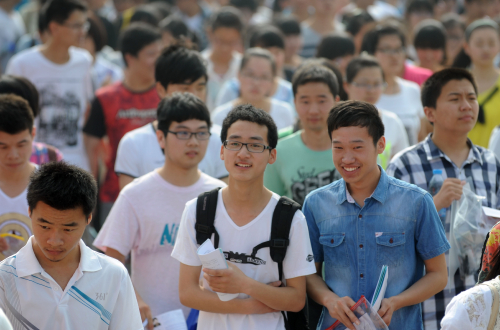|
 |
|
MOMENT OF TRUTH: Students in Haozhou, Anhui Province, enter a gaokao testing center on June 7, 2014, the first day of the two-day national college entrance examination (CFP) |
Chi Xuewei, Principal of the Changchun Experimental Secondary School in Changchun, northeast China's Jilin Province, said that the selective-class teaching method breaks the traditional fixed class arrangement in Chinese high schools, and encourage students to plan for their academic future during their secondary school education.
Chi has been closely following the education experiments in Zhejiang and Shanghai since September last year.
"Under the current system, students bury themselves in study for 12 years of primary and secondary education, and only start to think what they would do in the future after gaokao," said Chi. He said the reform will help inspire student potential and encourage in-depth pursuit of their gifted subjects.
In the new pilot programs, both regions will also do away with the former gaokao system in which 12th-graders took tests on six subjects in just three days. The students can take examinations on subjects other than math and Chinese twice between the 11th and 12th grades and submit the highest score to their college applications.
Liu Xiping, Director of the Zhejiang Provincial Department of Education, said at a news conference on September 19, 2014, that the new plan is to reduce the burden of the exams by splitting them into different periods.
Dai Xiaoping, an expert with the Zhejiang Research Institute of Education Science, said the reform will improve the quality of high school education in the long run.
"Currently, 12th-graders' last year in high school is extremely stressful because of the gaokao. They have to work very hard on at least six subjects during that year. With the reform, they can distribute what they study into different periods, which will help them learn each subject better," she said.
However, other experts think the changes may also introduce more pressure.
Students would have to fight "a prolonged battle" as a result, said Xiong with the 21st Century Education Research Institute. "In a way they will face gaokao levels of pressure from the first day of high school, knowing the scores they gain in the first two years also have a say in the university admission procedure."
Liu, with the provincial education department, said measures will be adopted to ensure that high schools do not arrange their curricula only for exams.
"The ultimate goal of the reform is to improve the quality of the education. Students are the first concern with this plan," he said.
Lu Jia, a teacher at Hangzhou Yuanqing High School, said rearranging curricula will be a challenge for high schools.
"Since students will choose different subjects, dealing with how to put them into class units is a challenge. For teachers, balancing classes according to tests is another challenge. We are still working on these issues," she said.
Meanwhile, according to the new guidelines released by the MOE on December 16 last year, the two pilot regions also rectified their pilot plans to grade the students' selected courses in levels but not score them.
"In this process, the biggest public concern is the abuse of power. People are worried that the admission will have no clear standard if the significance of scores is reduced," said Chu Zhaohui, a researcher at the Beijing-based National Institute of Education Sciences. "We need more professional and persuasive replacements to convince the public that the change will not damage fairness but evaluates applicants more comprehensively," Chu said.
| 